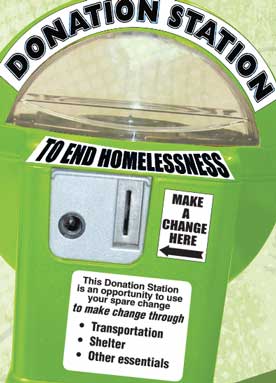
In an earlier post, I pointed out that not even the most heartless Ayn Rand disciple would go as far as some city governments and make it a crime to feed homeless people. I singled out Las Vegas as an example, citing a report by the ACLU:
In 2006, the City of Las Vegas became locked in a bizarre war with homeless advocates, and decided that no one should be engaging in charity in the public parks… When the ACLU of Nevada took issue with this interpretation of permit laws, the City took a more direct approach: it explicitly outlawed the sharing of food with anyone who looked poor…
Other homeless individuals were being kicked out of parks under a questionable trespass policy called “86”ing, where Park Marshals essentially took photographs of certain people – almost always homeless people – who were then kicked out of the public parks on pain of a trespass misdemeanor if they returned. The 86ing process had no paperwork, no right to appeal, and no due process whatsoever.
In my post, I summarized this mindset as, “How dare you help the poor yourself! You should be paying us to help them.”
In a comment, Jeff Gamso offered a different theory:
You probably give Las Vegas too much credit when you say that it insists that it alone provide for the needs of the poor.
The real message, I suspect, is that it doesn’t give a rat’s ass for the poor and that anyone giving them sustenance induces them to stick around rather than either dying or migrating to a less heartless community…
I had assumed Las Vegas has some sort of city-approved homeless services through which they wanted to funnel all aid. But I have to admit Gamso’s theory seems plausible. We could probably summarize that mindset as, “Ick! Smelly, smelly homeless people!”
Out of curiosity, I decided to Google around to see what kind of homelessness programs were available in Vegas, and it turns out there are a few. The real payoff, however, came from finding the official Las Vegas city government Ten-Year Homeless Services plan which specifies a grand total of two (2) programs for the homeless.
I admit don’t know much about homelessness, or what cities try to do about it, but neither of these two programs seems intended to actually help the homeless.
Reconnection to Family Program
This program provides one-way, one-time, out-of-town transportation assistance to individuals and families to reach designated housing with awaiting family and/or other secure housing situations and support.
In other words, although they try to dress it up as a plan for reuniting families, I think we can summarize Part 1 of Las Vegas’s Ten-Year Homeless services plan as putting homeless people on a bus out of town.
So it seems Jeff Gamso was right. At least until you read the description of the second program (complete with spiffy brochure):
Donation Stations to End Homelessness
A way to contribute to the city’s Home for Homeless Nevadans: 10 Year Plan to Reduce Homelessness. Spare change normally given to panhandlers will be redirected into programs for those at-risk of homelessness and currently homeless in the city of Las Vegas. Restored parking meters are painted a vibrant green color and installed in strategic downtown locations with significant foot traffic and panhandling issues. All collected coins will go directly to enhancing the city’s Housing and Homeless Services Program.
In other words, the goal of this program is to get residents to stop giving money to the homeless, and instead to give to the city of Las Vegas, which promises to use it to do nice things for homeless people. Perhaps even putting them on a bus out of town.
So it looks like Jeff Gamso and I were both right: The people who run Las Vegas don’t give a rat’s ass about homeless people, and they want you to pay them rather than helping the homeless directly.
I have to admit I don’t know much about homelessness, so before I posted this, I wanted to make sure I wasn’t criticizing programs that were actually more effective than they sounded. I contacted Neil Donovan, Executive Director of the National Coalition for the Homeless, who responded that
Unfortunately, these idea are all too common. They are even suggested by some “federal partners” and “advocacy” organizations. Las Vegas just happens to be “one of the best of the worst ideas”. It’s all too apparent that the homeless were not part of this planning process.
He went on to make a very important point about how governments respond to homelessness:
Las Vegas and hundreds of other communities are so frustrated by the chronic nature of this national social crisis called homelessness that they criminalize the very activities of daily living for those who are unhoused…
The homeless are hardly the only group that finds their everyday life to be the target of law enforcement, but they may be the least able to resist through the political process. Even worse, they are also the least able to give in: Criminalize driving while using a cell phone, and I’ll switch to a hands-free system, but what the heck is a homeless person supposed to do if you make it a crime to search dumpsters for food or accept handouts from strangers? Criminal punishment only works as a deterrent when people have options.
Leave a Reply